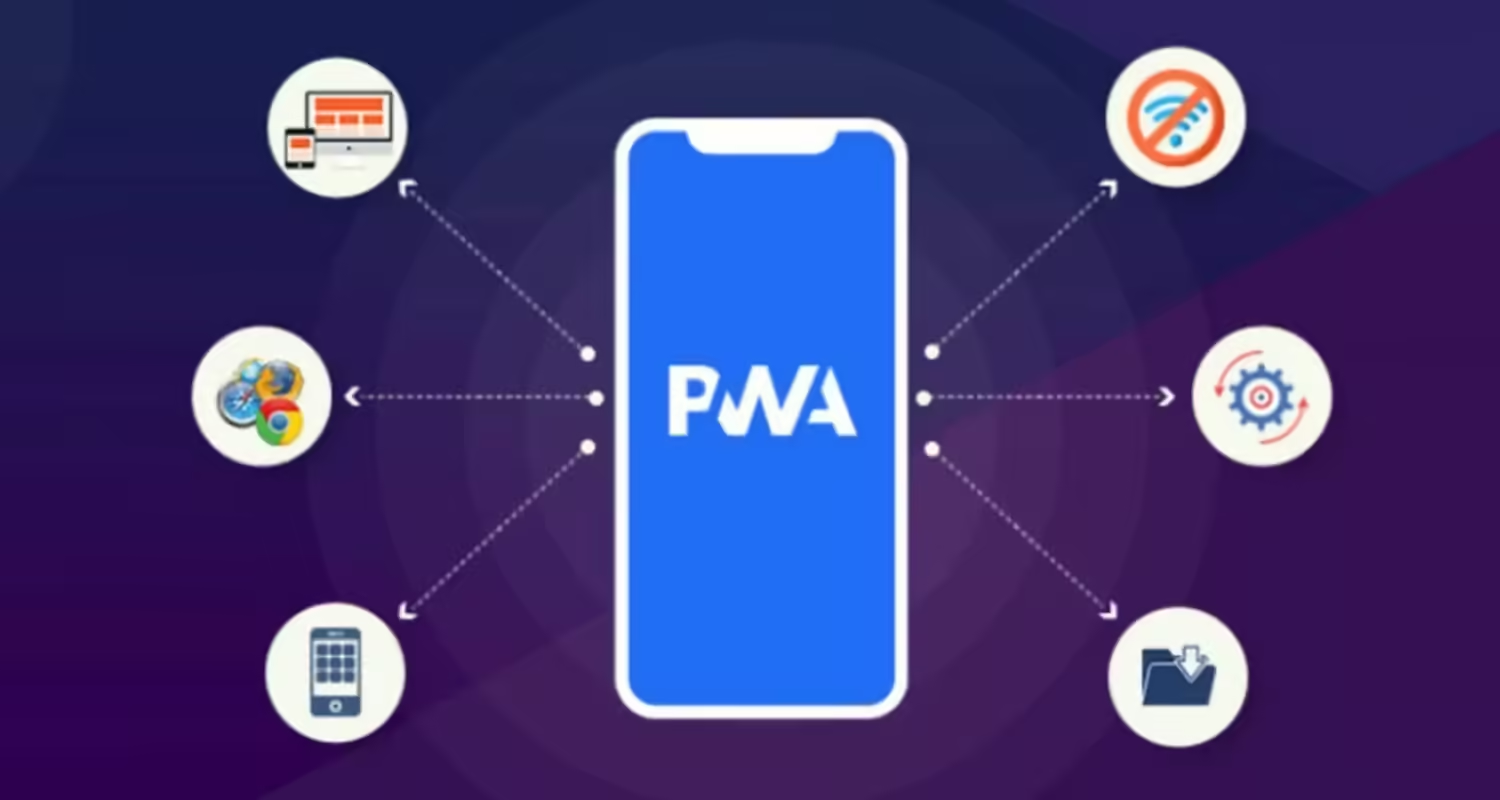In a world where mobile devices dominate our daily lives, Progressive Web Apps (PWAs) emerge as a game-changer. Imagine having the power of a native mobile app right in your browser! PWAs combine the best features of websites and mobile apps, offering a friendly user experience across various devices and platforms. They load quickly, work offline, and feel like a natural extension of your device, making them ideal for a mobile-first country like Qatar.
Qatar’s mobile-savvy population deserves a digital experience that aligns with their lifestyle. PWAs are tailor-made for this. They leverage modern web technologies to deliver fast, engaging, and reliable experiences, regardless of network conditions. With Qatar’s priority on digital transformation and connectivity, PWAs are:
- A catalyst.
- Bridging the gap between traditional websites and native mobile apps.
- Offering a unified experience accessible to all.
In a rapidly evolving digital landscape, PWAs present a compelling solution for businesses and organizations in Qatar looking to enhance their mobile presence. By using the power of PWAs, they can reach a wider audience, boost engagement, and drive conversions. With its blend of accessibility, performance, and functionality, PWAs are poised to revolutionize the mobile experience in Qatar, empowering users and businesses.
About PWAs and Mobile-First Development
Progressive Web Apps (PWAs) represent a key advancement in digital development, particularly in Qatar, where mobile usage dominates. These web applications emulate the functionalities of native mobile apps, ensuring optimal performance even in challenging network conditions. The necessity for PWAs stems from their ability to provide users with a unified, app-like experience directly within their web browsers, transcending the limitations of traditional websites.
PWAs offer many advantages, especially for businesses and organizations in Qatar seeking to optimize their mobile presence. Cost-effectiveness, cross-platform compatibility, and streamlined development processes characterize their utility. By using PWAs, entities can establish a powerful mobile presence without the complexities of developing separate applications for various platforms. Furthermore, PWAs improve user engagement through features like push notifications and offline accessibility, fostering sustained interactions and brand loyalty. In Qatar’s mobile-centric landscape, embracing PWAs is imperative for organizations striving to remain competitive to their digitally savvy audience.
Why do You Need it?
For many reasons, progressive Web Apps (PWAs) are required in Qatar’s mobile-first landscape. They offer users a seamless experience, combining the best web and mobile applications while loading quickly and feeling native. Their offline functionality ensures uninterrupted access to essential features, which are essential in regions with varying network reliability. Moreover, these are cost-effective, requiring a single codebase for cross-platform compatibility and reducing development time and costs. Their accessibility via web browsers on any device expands reach, making them ideal for reaching diverse demographics. Furthermore, the optimized performance enhances user engagement, improving business outcomes.
Enhanced User Experience
PWAs provide users with a seamless and engaging experience, combining the best features of web and mobile applications. They load quickly, offer smooth navigation, and feel like native apps, enhancing user satisfaction.
Offline Functionality
One of the most significant benefits of PWAs is their ability to work offline or with limited connectivity. This attribute is useful. Users can access essential features and content even offline, ensuring uninterrupted usage.
Cost-Effectiveness
Developing separate native apps for iOS and Android platforms can be costly and time-consuming. They offer a cost-effective alternative as they require a single codebase that works across different devices and platforms, reducing development time and costs.
Reach and Accessibility
PWAs are accessible to a broader audience since they can be accessed via web browsers on any device without needing app store downloads or installations. This accessibility makes them ideal for reaching users across diverse demographics in Qatar.
Improved Performance
PWAs are optimized for performance, with faster loading times and smoother navigation. This enhances user engagement and satisfaction, leading to higher conversion rates and improved business outcomes.
These are essential for businesses and organizations in Qatar seeking to provide a superior mobile experience to their users while maximizing reach, minimizing costs, and ensuring reliability in varying network conditions.
How do developers create a PWA for your app?
Planning and Design
Developers plan the application’s architecture considering the principles of Progressive Web Apps (PWAs). They determine which technologies and frameworks best suit the app’s requirements, such as choosing between React, Angular, or Vue.js for front-end development. Decisions are made regarding service worker integration, offline caching strategies, and the use of web app manifests for home screen installation.
Building the Front-end
Developers construct the application’s front end using HTML5, CSS3, and modern JavaScript frameworks. They ensure responsive design techniques, such as CSS media queries and flexbox/grid layouts, to guarantee optimal display across various devices and screen sizes.
Implementing Service Workers
Service workers, written in JavaScript, are implemented to handle offline functionality, push notifications, and background synchronization. Developers utilize the service worker API to intercept network requests, cache essential resources using strategies like cache-first or network-first, and manage the app’s lifecycle events such as install, activate, and fetch.
Adding Web App Manifest
A web app manifest, written in JSON format, provides metadata about the application to the browser. This includes the app’s name, icons, theme colors, and start URL. Developers ensure the manifest meets the specifications outlined by the Web App Manifest standard, enabling users to add the app to their home screens and launch it in standalone mode.
Testing and Debugging
Extensive testing uses browser developer tools, automated testing frameworks, and real devices to ensure cross-browser compatibility and functional correctness. Developers debug issues related to service worker registration, caching strategies, and responsive design inconsistencies using tools like Chrome DevTools and Lighthouse audits.
Optimizing Performance
Performance optimization techniques enhance the PWA’s speed and responsiveness. These include minifying and compressing CSS and JavaScript files, image optimization, and implementing lazy loading for non-critical resources. Developers use tools like Webpack and Babel to bundle and transpile code for efficient delivery to the browser.
Deploying the PWA
The PWA is deployed to a web server or hosting platform capable of serving HTTPS content. Developers configure the server to support HTTP/2 for improved performance and security. They ensure proper caching headers are set to leverage browser caching and minimize load times for returning visitors.
Monitoring and Maintenance
Monitoring tools like Google Analytics and Sentry track user engagement, performance metrics, and error logs. Continuous integration and deployment pipelines are established to automate deploying updates to the PWA. Developers regularly review and optimize the PWA’s codebase, addressing issues such as memory leaks, performance bottlenecks, and security vulnerabilities to ensure a seamless user experience.
The Promising Future of Progressive Web Apps
The future of Progressive Web Apps is promising, with ongoing advancements in web technologies and increased adoption by developers and businesses. As browsers continue to evolve and support more PWA features natively, such as background sync, periodic background sync, and app-like experiences, they will become even more powerful and capable. Additionally, emerging technologies like WebAssembly and WebGPU will further improve the capabilities of PWAs, enabling developers to create more refined and immersive experiences within the browser.
Moreover, the growing emphasis on mobile-first development and the rise of 5G networks will drive the demand for PWAs, as they offer a lightweight and efficient alternative to native mobile apps. With features like offline support, push notifications, and seamless installation, they bridge the gap between web and native experiences, providing users with a consistent and engaging experience across platforms and devices. As businesses recognize the benefits of PWAs in terms of reach, engagement, and cost-effectiveness, their adoption is expected to accelerate, making them an integral part of the future of web development.
Empowering Businesses with Leading Web App Services in Qatar
Saakin Technologies is a leading provider of web app development services in Qatar, offering smart solutions to meet the unique needs of businesses in the region. Focusing on innovation and quality, we deliver powerful web applications that entrust clients to enhance their online presence and drive business growth. From responsive designs to seamless user experiences, our expert team uses the latest technologies to create dynamic and engaging web applications. With a commitment to excellence and customer satisfaction, Saakin Technologies is a trusted partner for businesses seeking to get the power of the web to achieve their goals in Qatar and beyond.
FAQs
What are PWAs?
Mobile-friendly websites offer app-like experiences, including push notifications and offline access.
Why PWAs for Qatar?
Improve mobile experiences, boost engagement, and bridge digital divides with accessible, responsive technology.
How do PWAs work?
Utilize service workers to cache content, ensuring fast loading and offline functionality.
Are PWAs cost-effective?
Yes, requiring fewer resources than native apps while delivering comparable user experiences.
Can PWAs replace native apps?
While not identical, PWAs offer significant advantages, especially for emerging markets like Qatar.
What sets Saakin Technologies apart in web app development?
At Saakin Technologies, we stand out for our focus on innovation and quality. Our expert team applies the latest technologies to create dynamic and engaging web experiences, from responsive designs to seamless user interfaces. We empower businesses to upgrade their online presence and drive growth.
Why choose Saakin Technologies for web app development in Qatar?
Saakin Technologies is a leading provider of web app development services in Qatar. Whether responsive designs or innovative functionalities, our team ensures that every project is executed precisely and excellently, enabling our clients to achieve their goals.





